Menu
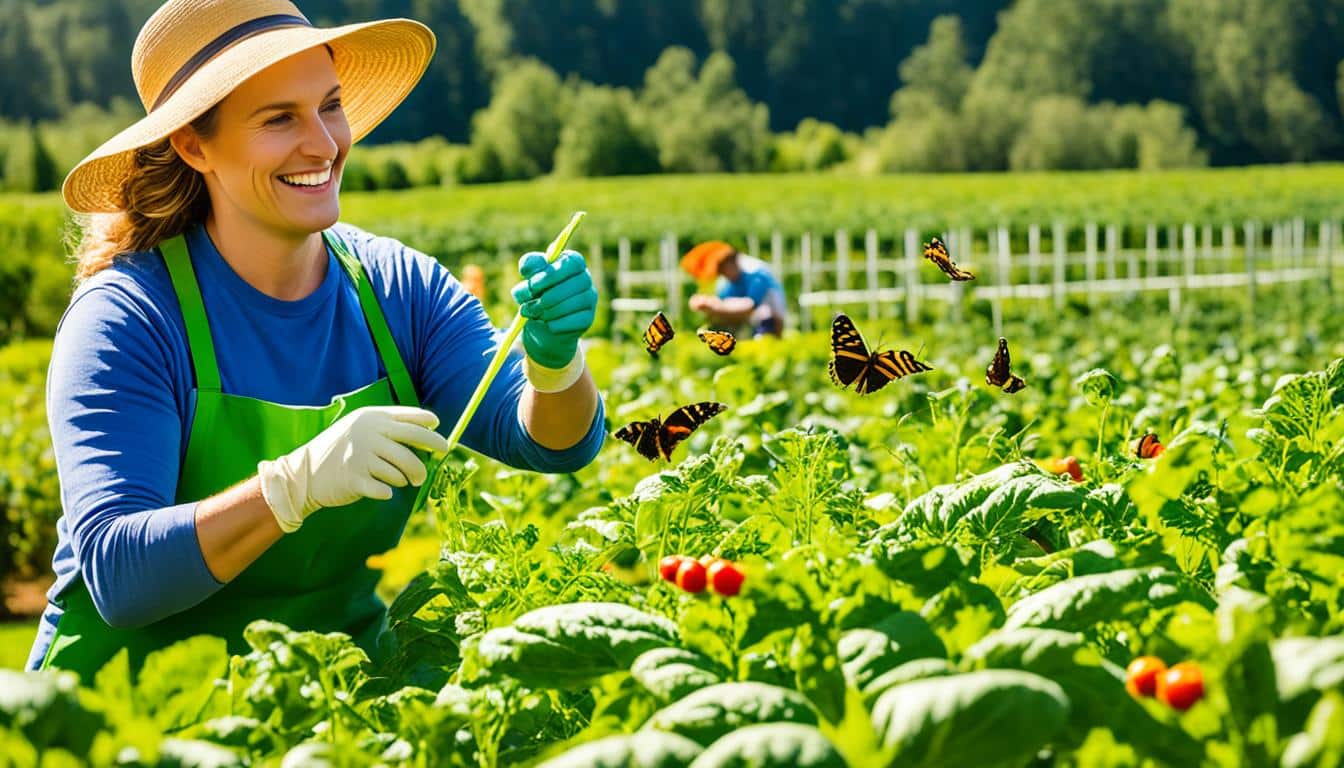
Did you know that 77% of Nitrogen Oxide emissions are because of how we manage agricultural soil? This key fact shows how farming affects our environment. It highlights the need for more sustainable ways. Organic farming is the shining example of such a method. It stands out for being both eco-friendly and profitable. This approach uses natural ways to control pests and nourish the soil. This is good not only for our planet but also for farmers’ incomes.
This explainer will introduce you to the basics of organic farming. It will explain why it’s key and what advantages it brings. Eco-friendly farming techniques are vital against climate change. They reduce carbon emissions, care for water and the ecosystem. The future of farming and our health depend on these eco-values.
Follow along as we dive into the details and transformational power of organic farming. We’ll give you tips to confidently start an organic farm. By choosing sustainable farming practices, we can work towards a brighter future.
Organic farming is a way back to natural practices in agriculture. It focuses on keeping the Earth healthy. It also brings both economic and environmental benefits.
The key ideas in organic farming are knowing where our food comes from, helping nature thrive, and lessening farm harm to our world. This way of farming is good for the planet in the long run. It helps fight against global warming.
Organic farming uses natural materials and methods. This keeps the soil rich and manages pests without harmful chemicals. It sticks to special principles.
These include using natural ways to control pests and fertilising with plant-based things. More people are picking organic food. They want to lessen the bad effects of farming on our world.
People are wanting more organic goods. In North America, the demand for organic food is growing fast. In 2008, Canada’s organic market was worth over $1.5 billion.
This growth shows folks value the good organic farming does. It helps the environment and keeps food safe for all of us. Plus, it supports local farmers.
Organic foods are certified to be truly organic, meeting strict guidelines. In Canada, anything with the Canada Organic logo means it’s 95% true organic. This process builds trust with the people who eat these foods.
It takes a few years for farmlands to meet these strict organic rules. After this waiting period, the first fully organic crops are ready.
Overall, organic farming is vital for our Earth and our future. It teaches us a sustainable way of farming. This way, we can have food that’s good for us and also good for our planet.
| Region | Estimated Organic Food Market (2008) | Percentage of Organic Consumption |
|---|---|---|
| Canada | $1.5 Billion | 70% Imported |
| USA | $22.9 Billion | 60% of Consumers Bought Organic Products |
Organic farming helps the environment, economy, and our health. It’s a super beneficial way of farming. Studies show it boosts soil health, fighting climate change well. By not using chemicals, it keeps our planet safe for the future.
Organic farming is great for our planet. It boosts biodiversity compared to regular farming. This helps ecosystems stay strong and fight off invasive species.
It also cuts down water pollution. This pollution mostly comes from common farming methods. Organic farms don’t use synthetic chemicals, stopping harmful water runoff. Plus, they lock up carbon in the soil, cutting down on harmful gases in the air.
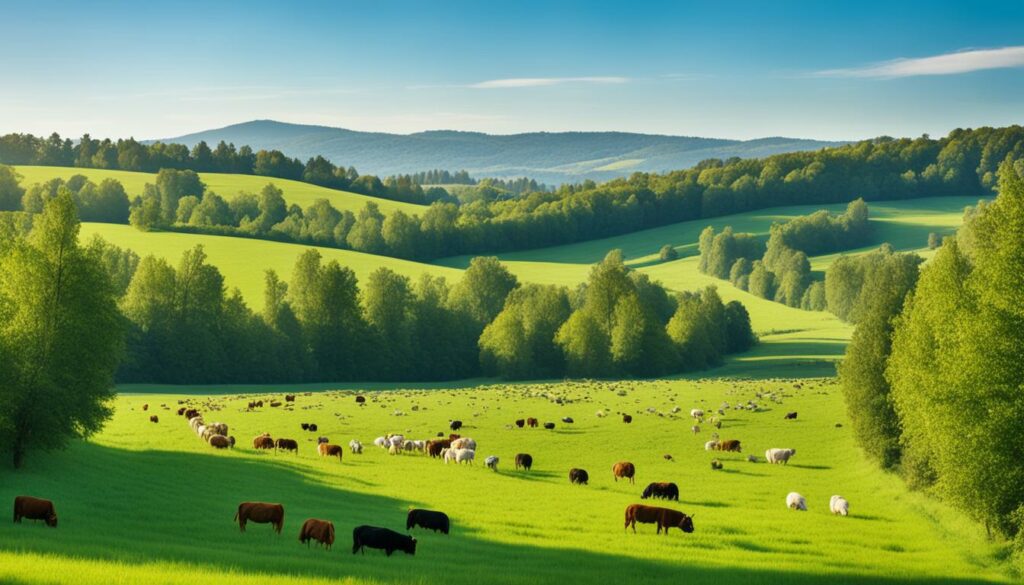
On the money side, organic farming makes sense too. It’s more water-saving than traditional farming, shown in places like Australia and the US. This is really important because the world is running out of water.
Also, more and more people are buying organic food. This growth gives farmers a good reason to switch to organic ways.
Choosing organic means choosing health. It avoids dangerous chemicals and GMOs. These can harm not just the food we eat but also the people who grow it.
Going organic means choosing food that’s safe for the earth and us. It keeps the natural world diverse and free from harmful genetic changes.
Organic farming is the way forward. It improves soil, fights climate change, and brings great food. It’s key to a sustainable tomorrow.
Organic farming is crucial for the health of our soil and for creating farming methods that will last. It includes important steps like changing the type of crops in fields, using natural fertilisers, and managing pests without harmful chemicals. These steps help farming work with nature.
Crop rotation is key in keeping the soil healthy and stopping pests and diseases. By growing different crops each year in the same field, the soil’s nutrients are kept balanced. This method not only helps the soil stay fertile but also boosts its tiny, living helpers.
Organic fertilisers like compost and green manure are essential. They are better for the earth than chemical versions. Organic fertilisers make the soil stronger and improve its water use. This is especially important in areas with water concerns. Using these means farming can be healthier, without the toxic effects of chemicals.
Managing pests the natural way means focusing on creating a full and healthy ecosystem. This attracts helpful bugs and animals. In a balanced farm, pests are kept under control without the need for dangerous pesticides. This keeps nature in balance and farming strong. Organic farming protects the land and its resources in a sustainable way.
Learning about differences between farming methods shows us the key contrasts between organic and conventional farming. The organic way values chemical-free cultivation, good practices with the earth, and treating animals kindly. Let’s dive into how these ideas differ in each type of farming.
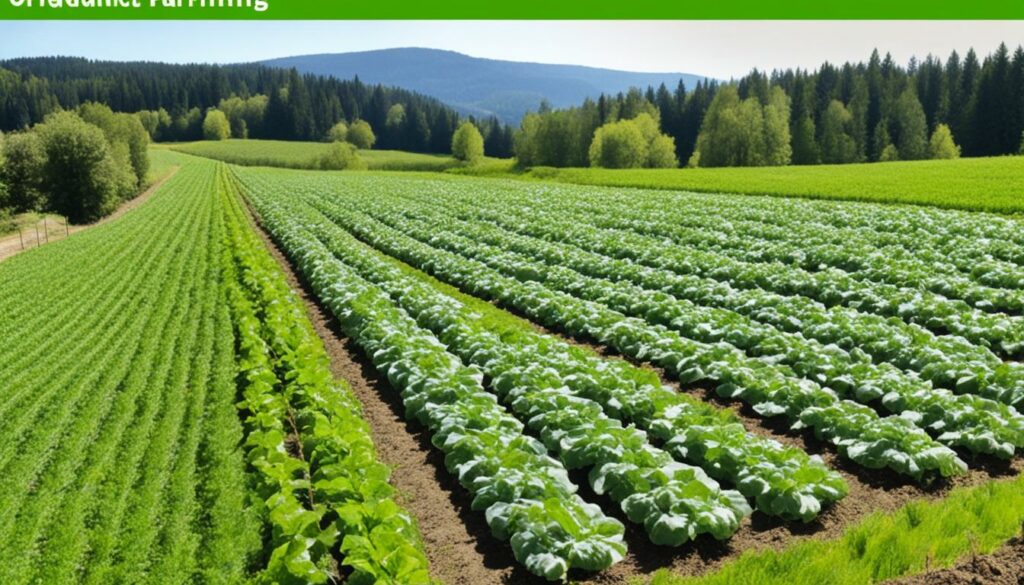
Organic farming only uses natural fertilisers like compost and manure. This chemical-free cultivation is kind to the planet and boosts nature’s balance. Conventional farming opts for synthetic fertilisers and pesticides. These can damage the soil’s health and add to pollution.
The way soil is cared for also sets the two farming styles apart. Organic farming takes care of the soil with crop rotation and less ploughing. This leads to a fertile soil full of life. But, conventional farming mostly means lots of ploughing and growing only one type of crop. This can make the soil worse over time.
How animals are treated is very different in organic and conventional farming. Organic farms focus on humane livestock treatment. They give animals natural food, space to roam, and avoid using certain drugs. Conventional farming, on the other hand, usually keeps animals penned up. The focus is more on profit than on the animals’ well-being.
| Aspect | Organic Farming | Conventional Farming |
|---|---|---|
| Chemical Inputs | Chemical-free cultivation using natural fertilisers | Relies on synthetic chemicals and pesticides |
| Soil Management | Sustainable soil practices with minimal tilling | Frequent tilling leading to soil degradation |
| Animal Welfare | Emphasis on humane livestock treatment | Often confined and treated as commodities |
These differences show how farming choices affect the planet and animal well-being. They point to bigger issues like sustainability and ethical farming.
Starting an organic farm is both thrilling and demanding. You must pick the right land, ready the soil, and select the best crops. This is key to starting a farm that’s not only successful but also kind to the environment.
Choosing the right spot marks the beginning of a good organic farm. It’s important to pick areas based on:
Thinking about these points helps create a place where plants can grow well. This leads to more crops and a farm that lasts.
Getting the soil ready is a must in organic farming. It should be full of nutrients, drain well, and help plants grow strong. To do this, follow these steps:
With the right soil, your crops will be healthy and give good harvests.
Picking the best crops is crucial for an organic farm. Choose plants that:
It’s also important to plan when to plant each type of crop. This keeps the soil healthy and your harvests good.
| Aspect | Details |
|---|---|
| Site Selection | Sunlight exposure, water proximity, avoid root competition |
| Soil Preparation | Composting, nutrient enrichment, regular soil testing |
| Crop Variety Selection | Native and climate-suited crops, pest resistance, biodiversity |
If you plan well and work hard, starting an organic farm can be very fulfilling. Choosing the right land, preparing the soil, and picking the best crops are all essential. They help to start and grow a successful organic farm.
Good water management is key in successful organic farming. Using techniques that respect the natural flow of water, we make sure our farms use water well. At the same time, this promotes farming in a way that helps the environment and our land to be more fruitful.
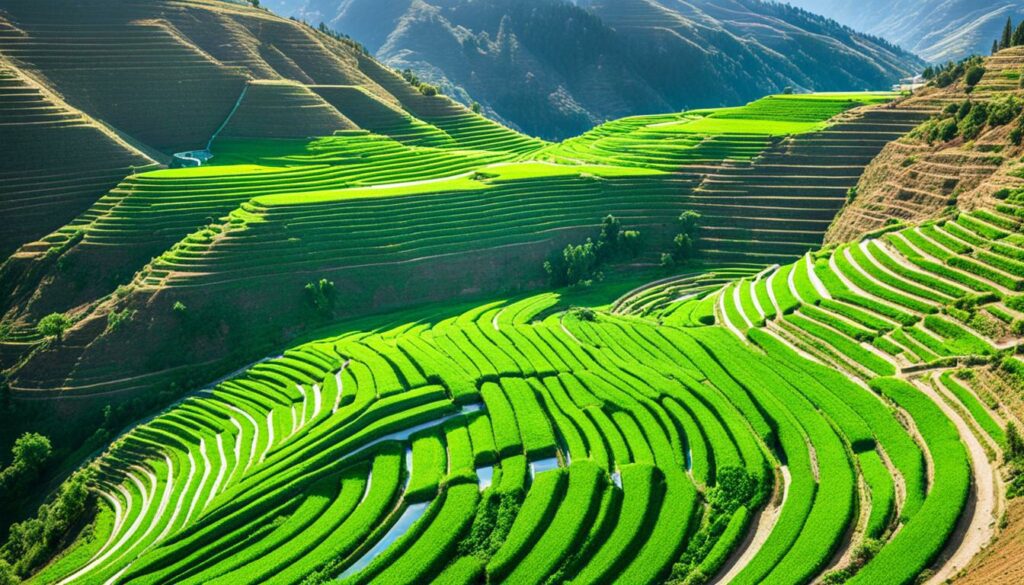
To keep the soil moist without watering too much, farmers use certain techniques. Mulching is a top choice, cutting down water loss due to evaporation. It locks moisture in the soil. Organic matter like straw or wood chips makes a good cover, stopping moisture from escaping.
Conservation tillage is also vital. It means keeping up to 30% of crop leftovers on the soil. This method not only keeps the soil moist but also stops it from being washed away. Adding cover crops further boosts the soil’s water-holding power and helps it soak up moisture deeply.
Using water smarter is important for saving water and growing better crops. With precision irrigation methods like drip systems, farmers can save a lot of water. This way, it goes directly to the roots. Using less water than traditional sprinklers, this method aims to water where it’s most needed.
To tackle dry times, storing rainwater with special systems is a smart move. Using irrigation systems that cut down on water waste is advised. Machines that move over the field can water evenly, making the most of every drop.
Studies show that organic farms use water much more effectively than non-organic ones do. They’re over three times better at using water. Adding smart systems for monitoring and controlling irrigation helps manage water well and keep crops safe from harm.
| Technique | Water Savings |
|---|---|
| Drip Irrigation | 80% |
| Mulching | 70% |
| Precision Irrigation | 60% |
By putting together these water-saving approaches, we can achieve a lot. We not only save water but also make sure our farms stay healthy and productive for the long haul.
Ensuring soil health is key for a lively organic farm. By using methods like organic mulching and composting, we boost fertility. These ways help keep the soil rich and productive.
Placing mulches, such as straw or wood chips, has many pluses. It keeps moisture in, needing less water use. Mulches also stop soil washout and prevent weed growth, benefiting plant life.
As these mulches break down, they provide nutrients for the soil. This helps foster plant growth. It’s a natural method that suits eco-friendly farming and sustainable agriculture aims.
Turning organic rubbish into compost boosts the soil’s health. This activity nurtures a thriving environment for plants.
We use compost in line with Organic Program rules all through the year. It helps cycle nutrients better, strengthens soil, and feeds plants well.
Choosing when and how to use animal waste in compost is crucial. It avoids excessive phosphorus and keeps to organic farm criteria. Composting is vital for soil health and a lasting farm strategy.
To summarise the impacts effectively, we present the key differences and benefits:
| Technique | Benefits | Considerations |
|---|---|---|
| Organic Mulching |
|
|
| Composting |
|
|
By using these organic methods, we make our soil more fertile. This, in turn, supports the health and future of our farming.
Organic certification builds faith in organic labels. It’s more than just a nod. It’s a detailed process that checks farms follow strict organic rules.
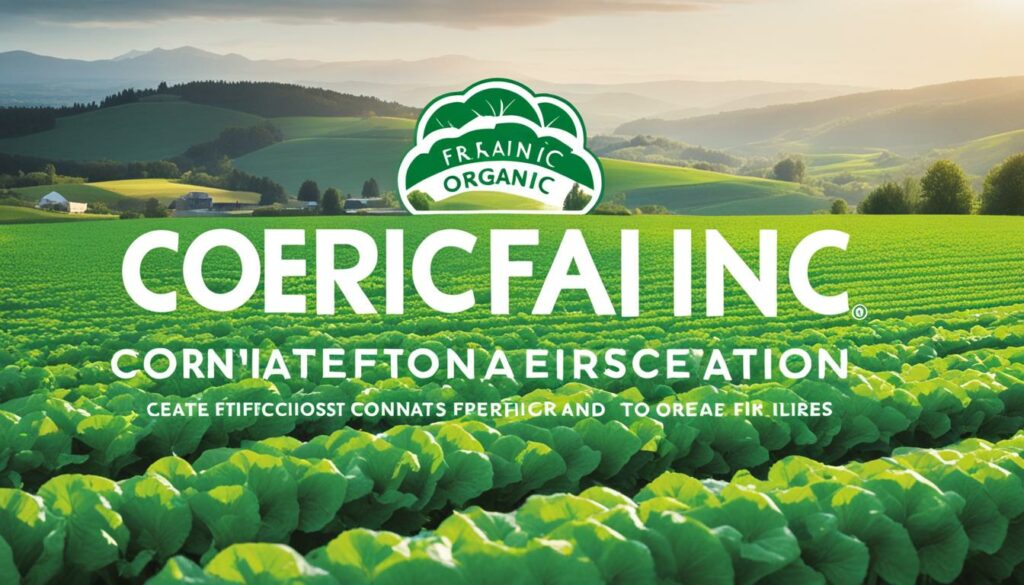
Many groups certify organic goods. In the US, the USDA sets the bar high with its rules. To earn the organic badge, products must meet these tough requirements. Regular checks ensure rules are always obeyed.
In Australia and New Zealand, BioGro NZ stands out. It checks farms each year, looking into how they treat animals and use packaging. Plus, the National Organic Standards Board, made of organic fans, puts your thoughts into making the rules fair.
Certification starts with a plan. Then, inspectors visit. They check if the farm is doing things the organic way. The enforcement rule improves checks to keep the system honest.
Farms and companies must keep good records and have a check-up each year. They must also keep improving. Thanks to the Organic Integrity Database, it’s easier to know if something marked as organic really is.
Organic certification takes a lot of work. But, lots of producers choose to go for it. They think it makes their goods better. The USDA’s Organic Literacy Initiative is there to help, offering knowledge and support to those moving into organic farming.
In organic farming, pest control uses natural means. It mixes biological control with eco-friendly methods. These approaches keep pests in check without using harmful chemicals. This way, the natural balance of the environment is kept safe.
Using helpful bugs is a key tactic. These insects are natural enemies to many pests. By attracting Lacewings, Ladybugs, Hoverflies, and some wasps, harmful insect levels drop. To make sure these helpers work well, it’s vital to regularly look for pests, aided by tools like hand lenses.
When there are too many pests, something more is needed. Organic farmers can use natural pesticides. These can be plant-based or from other natural sources. Neem oil, for example, is good for combating lots of pests. It’s often sprayed on leaves. You can also make a safe mix with bicarbonate of soda, water, and oil to fight some diseases without harming the environment.
Organic livestock farming means we care for both animals and nature. We follow strict rules to ensure our animals live naturally. They must be outside all year, unless it’s dangerous for them.
Feeding nutritional feed for organic livestock is key. Animals get 100% organic feed, with a few vitamins allowed. Such livestock, like cows and goats, must eat from certified organic land for at least 120 days each year. It’s a rule that their diet is mainly from this land during that time.
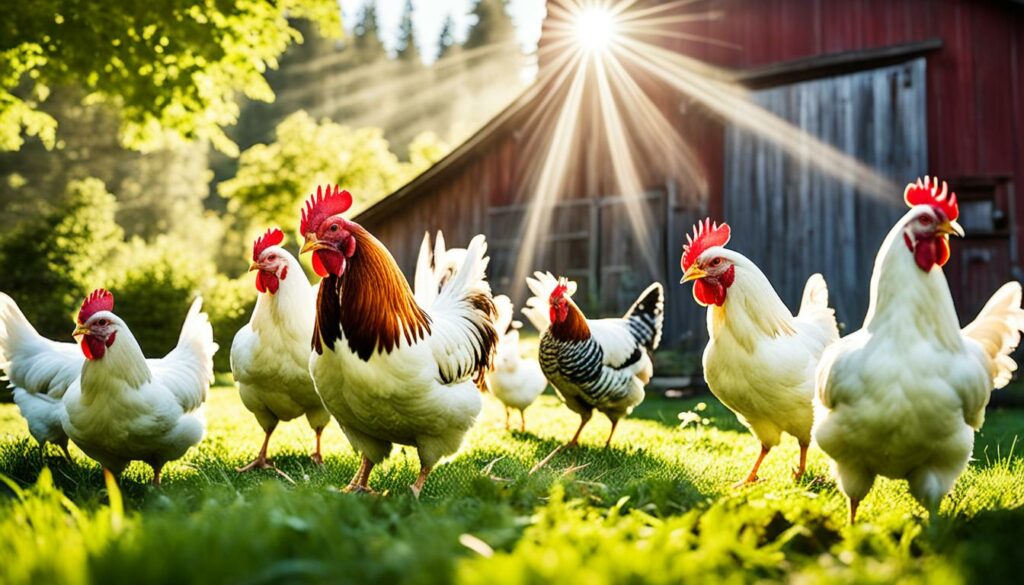
They especially benefit from eating from the land, which makes them healthier. It cuts down on health problems and reduces costs for farmers. Also, these methods are good for the environment as they limit pollution.
In the organic way, treating animals well is vital. They all have plenty of room, clean air, and food without artificial drugs. If we get a new organic label, we have to give animals places where they can act naturally.
It takes time to switch animals to organic care, maybe up to a year. Dairy animals, for example, need a full year under organic rules before their milk is organic. Once animals lose their organic status, we can’t make them organic again.
Our goal is to create a system where animals, people, and nature benefit together, living in harmony.
If you’re new to organic gardening, start with space-saving methods. Container gardening and growing herbs are key. In cities, container gardens are great for small areas.
Container gardening adds flexibility. It lets us put plants where they get the most sun. For instance, tomatoes and peppers need full sun for 6 to 8 hours a day. Leafy greens don’t need as much sun and can grow in shadier spots.
Pick the right size container for your plants. The soil should have compost. This helps plants grow better than with store-bought soil. Plants benefit from Miracle-Gro® Performance Organics® All Purpose Container Mix. It’s great for their health.
Growing herbs is great for having fresh flavours anytime. Putting herbs near the kitchen makes using them easy. It also adds taste and nutrients to your food.
Choose herbs that grow well in your area. Plants like basil and mint do well in small pots indoors. Keep your plants away from pests by picking resistant ones. Use natural means to control pests.
To garden well in cities, use drip irrigation to save water. This also keeps plant diseases at bay. Cover the soil with organic mulch. This stops weeds and helps keep the soil moist, making your plants grow better.
Keep your garden clean by regularly clearing away leaves and twigs. This stops pests and keeps the soil full of nutrients. With good care and crop rotation, you support a healthy and green urban life.
| Type | Needs | Benefits |
|---|---|---|
| Fruiting Plants | Full Sun (6-8 hours/day) | Optimal Growth |
| Leafy Greens | Partial Sun (3+ hours/day) | Low Maintenance |
| Herbs | Varies | Accessible Flavours |
Starting an organic farm is both fulfilling and tough. Challenges are part of the journey, demanding new ideas and strength. We’ll explore how to beat these challenges and keep our farms eco-friendly.
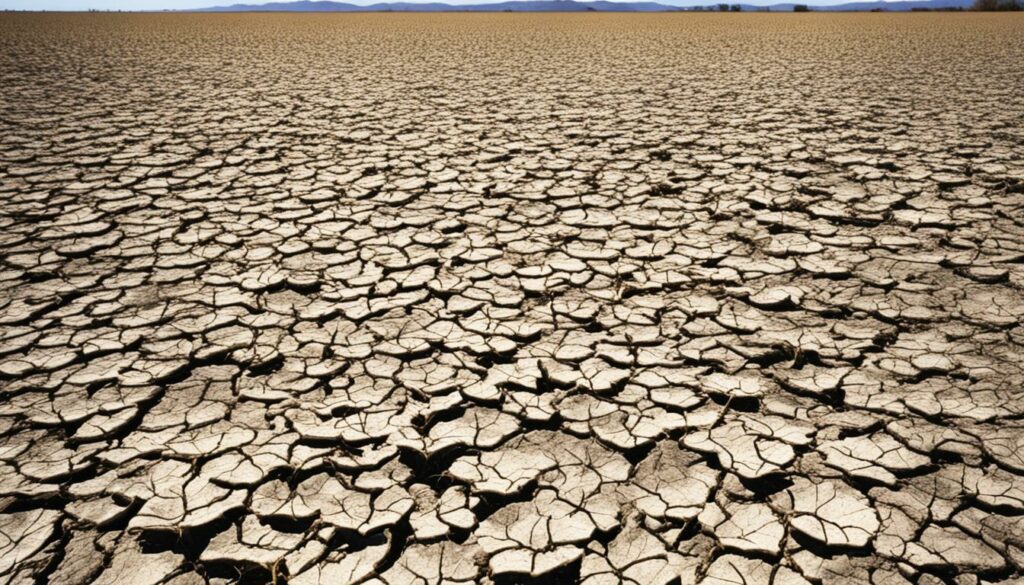
Sustainable farming faces big issues with pests and diseases. To fight these, farmers use methods like Integrated Pest Management (IPM). Techniques include changing the crops’ placement, mixing them, and bringing in helpful bugs.
Ladybirds, for example, eat aphids. If the problem gets really bad, farmers might use things like neem oil. This approach limits the use of harsh chemicals.
Keeping the soil healthy is also key. Farmers use composting and grow certain plants in between crops. These practices keep the soil rich without artificial products like fertilisers. They also control weeds naturally with mulch or by burning them away.
The weather can really shake things up on a farm. Too little or too much rain can cause big problems. To tackle this, farmers create little sheltered areas and varied crops. These methods help protect plants and keep the farm running, even in tough weather.
Learning never stops in organic farming. Workshops and growing networks help keep farmers informed. This ongoing education equips farmers to deal with new challenges and adopt the best practices. It also opens doors to new markets.
Patience, hard work, and a thirst for knowledge are vital in organic farming. By facing these challenges head-on, we build farms that are both strong and green.
Choosing organic farming is a big yet fulfilling step towards caring for our planet and its future. Though organic foods make up less than one percent of what’s grown, people are turning to them. This change is because of concerns over worsening soil, water, and effects on nature.
Farmers who go organic often get help from their governments. This help can be in the form of money or support for learning and promoting their products. In poorer countries, farmers switch to organic ways because they are good for the earth and the wallet. Organic farming is also better at coping with tough weather, like droughts.
More organic food might lead to prices going up and down because the market is still small. But, strong actions like better research, teaching, and making sure farms are really organic are key. To be considered organic by the USDA, farms need to meet high standards. This means more costs for them, but it also shows their food is truly organic.
Supporting organic farming can help our planet and make us healthier. It starts important talks about the good and bad of going organic. This way, we can get the most from organic farming and ensure they meet our future food needs. Choosing organic isn’t just a new trend; it’s vital for our health and planet. It’s about leaving a better world for those who come after us.
Organic farming is a way of growing crops without using man-made chemicals. It focuses on keeping the soil healthy. This method helps nature by supporting different plants and animals.
It’s key for making sure we can keep growing food without harming the environment. Organic farming promotes non-toxic methods and healthy soil. This is good for nature and us over time.
Organic farming stops soil from washing away and makes the soil richer. It helps lessen air pollution. By growing food this way, the water and the land stay clean.
Choosing organic farming can be cheaper in the long run. It saves water and doesn’t need costly chemicals. Plus, organic food can sell for more if you do it well.
Organic food is better because it is not full of chemicals. It’s more nutritious and it helps keep the whole environment healthy, which is good for people now and later.
Crop rotation means planting different things in the same part of the field each year. This stops the soil from getting tired and keeps bugs from ruining the crops.
Organic fertilisers are natural materials like compost and animal waste. They feed the plants and keep the soil soft without the bad effects of man-made products.
Organic farmers use nature to fight pests. They bring in good bugs, use natural chemicals found in plants, and don’t use strong poisons.
Organic farmers don’t use man-made chemicals or treat animals badly. They work with nature to keep the soil and the food healthy.
To start an organic farm, you need good sunlight and clean water. The ground should be fertile and free of big trees that can take the food away from your crops.
They make the soil better by putting in compost and other natural things. This makes the soil full of nutrients. It’s a natural way to help plants grow strong.
Pick plants that like the local weather and don’t get sick easily. Using different crops in a smart way helps the farm stay healthy without chemicals.
Techniques like mulching and good soil preparation keep the water where plants can use it. This is good for the plants and saves water at the same time.
They make sure the water gets right to the plant’s roots and isn’t wasted. Saving and using water well is important in organic farming.
Organic mulching protects the soil and keeps it moist with things like straw. It’s a simple way to make the farm healthier and not use chemicals.
Composting turns waste into something plants can grow in. It makes the soil alive and full of nutrients. This helps plants grow big and healthy.
BioGro NZ is one of the important groups that make sure farms are really organic. They check the farms to make sure they do things the right way.
To be certified, farms need to keep good records and follow strict rules about how they treat the land and animals. They’re checked every year to keep their certification.
Organic farmers let helpful insects, birds, and other animals eat the pests. This way, they don’t need to use chemicals that harm the environment.
They use things like plant oils and minerals to keep the bugs away. These are natural but still protect the crops without poisoning the land.
Organic farms treat animals well and naturally. They feed them good food, let them move around, and keep them healthy. This is better for the animals and for the food we get from them.
Growing in containers is easy and works in small spaces. It’s good for the city and means you can still have fresh food, even if you don’t have much room.
You keep herbs healthy by feeding the soil right, covering it, and making sure the herbs get enough sun. Even in a little space, you can grow things to eat.
Dealing with bugs, sickness, and the weather is hard. Organic farmers use smart planting, rich soil, and a mix of crops to stand up to these challenges.
They make the soil able to keep water during dry times and shelters to protect the crops in bad weather. This helps the farm bounce back from hard times.